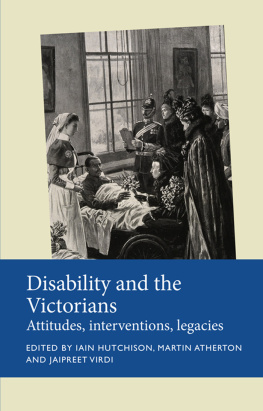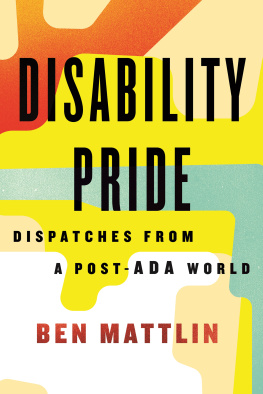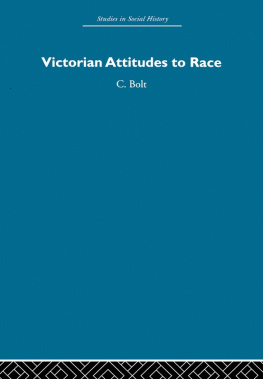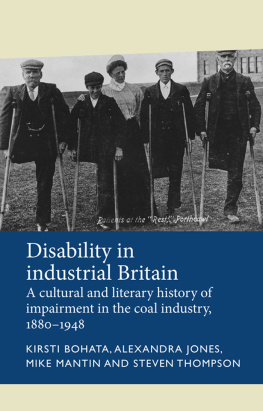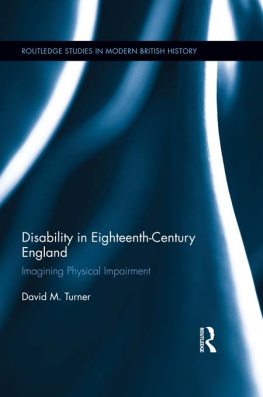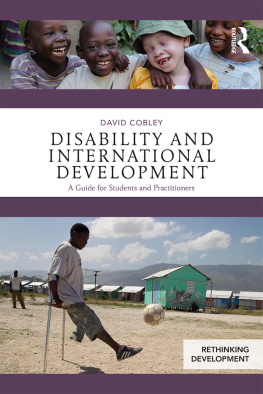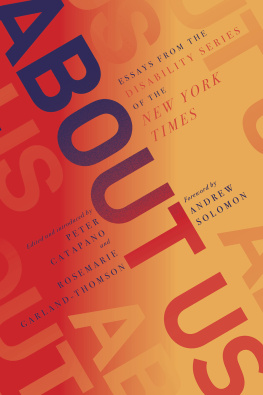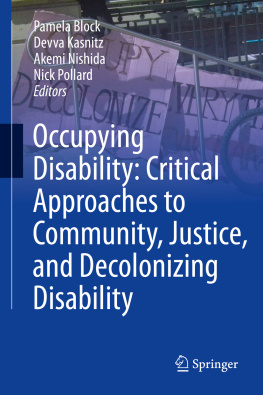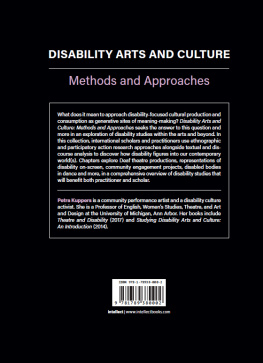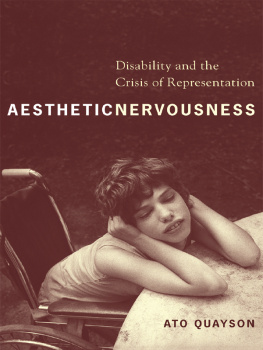Series editors
Dr Julie Anderson, Professor Walton O. Schalick, III
This series published by Manchester University Press responds to the growing interest in disability as a discipline worthy of historical research. The series has a broad international historical remit, encompassing issues that include class, race, gender, age, war, medical treatment, professionalisation, environments, work, institutions and cultural and social aspects of disablement including representations of disabled people in literature, film, art and the media.
Already published
Deafness, community and culture in Britain: leisure and cohesion, 1945-1995
Martin Atherton
Rethinking modern prostheses in Anglo-American commodity cultures, 18201939
Claire L. Jones (ed.)
Destigmatising mental illness? Professional politics and public education in Britain, 18701970
Vicky Long
Intellectual disability: a conceptual history, 12001900
Patrick McDonagh, C. F. Goodey and Tim Stainton (eds)
Fools and idiots? Intellectual disability in the Middle Ages
Irina Metzler
Framing the moron: the social construction of feeble-mindedness in the American eugenics era
Gerald V. OBrien
Recycling the disabled: army, medicine, and modernity in WWI Germany
Heather R. Perry
Disability in the Industrial Revolution: physical impairment in British coalmining, 17801880
David M. Turner and Daniel Blackie
Worth saving: disabled children during the Second World War
Sue Wheatcroft
Copyright Manchester University Press 2020
While copyright in the volume as a whole is vested in Manchester University Press, copyright in individual chapters belongs to their respective authors, and no chapter may be reproduced wholly or in part without the express permission in writing of both author and publisher.
Published by Manchester University Press
Altrincham Street, Manchester M1 7JA
www.manchesteruniversitypress.co.uk
British Library Cataloguing-in-Publication Data
A catalogue record for this book is available from the British Library
ISBN978 1 5261 4571 0hardback
First published 2020
The publisher has no responsibility for the persistence or accuracy of URLs for any external or third-party internet websites referred to in this book, and does not guarantee that any content on such websites is, or will remain, accurate or appropriate.
Cover image:
Boer War: Queen Victoria presenting flowers to a wounded soldier during a visit to the Herbert Hospital, Woolwich. Halftone after S. Begg, 1900. Credit: Wellcome Collection. CC BY
Typeset
by Toppan Best-set Premedia Limited
Martin Atherton (co-editor) is a social historian of deafness and deaf people. His research covers a range of topics, including lived experiences and narratives, leisure and sport, education, family relationships and social policy. Martin retired from his position in the School of Humanities and Social Sciences at the University of Central Lancashire in summer 2018.
Esme Cleall is a lecturer in the Department of History, University of Sheffield and is a social and cultural historian of the British Empire. Her work explores the relationship between ethnicity, religion, gender and disability across different sites of the nineteenth- and twentieth-century British Empire, including India, southern Africa and imperial Britain. Her first book, Missionary Discourses of Difference, was published with Palgrave in 2012 and she has since produced several articles on disability and deafness.
Deborah M. Fratz is Associate Professor of English, Languages and Literatures at the University of Wisconsin-Whitewater. She teaches nineteenth-century British literature and critical writing and has a particular interest in the representation of disability in Romanticism literature.
Paula Hellal is Honorary Research Fellow in the Department of Applied Linguistics and Communication, Birkbeck College, University of London. She has published extensively on childhood language development and disabilities, and has a particular interest in nineteenth-century responses and attitudes.
Iain Hutchison (co-editor) is a Research Associate at the Centre for the History of Medicine at the University of Glasgow and a board member of the Disability History Association. His main research interests concern the experience of mental, physical and sensory disability in Scotland across the long nineteenth century.
Caroline Lieffers is an Assistant Professor of History at The King's University, Edmonton, Canada. She specialises in disability, health technologies and transnational exchange in the nineteenth and early twentieth centuries.
Marjorie Lorch is Professor of Neurolinguistics in the Department of Applied Linguistics and Communication, Birkbeck College, University of London. She researches how language is organised in the brain through the investigation of neurogenic language and communication disorders. One strand of her research focuses on the nineteenth-century history of ideas about language and communication and its relation to thought.
Amy W. Farnbach Pearson is a historical anthropologist at the Health Sciences Center, University of New Mexico and a Research Affiliate at the Center for Bioarchaeological Research, Arizona State University. She investigates Western medical concepts of health and disease and doctorpatient relationships.
Fred Reid is Honorary Professor in History at the University of Warwick. His research interests are various, including British labour history, history and literature, and all aspects of blindness. He himself became blind at the age of fourteen. As well as his academic work, he has served as President of the National Federation of the Blind, as a trustee of the Royal National Institute of Blind People and on the executive boards of the Disability Income Group and the Disability Alliance.
Jaipreet Virdi (co-editor) is Assistant Professor in the Department of History, University of Delaware. Her work intersects the history of medicine and disability history. Her first book is Hearing Happiness: Fakes, Frauds, and Fads in Deafness Cures (University of Chicago Press).
Joanne Woiak is a lecturer in the Department of Disability Studies, University of Washington. Her research interests encompass the social justice implications of knowledge about genetics, reproduction and health in the modern era. She focuses on disability in American and British history and culture, including the history of eugenics and sterilisation, discourses about alcoholism, science fiction and disability pedagogy.

